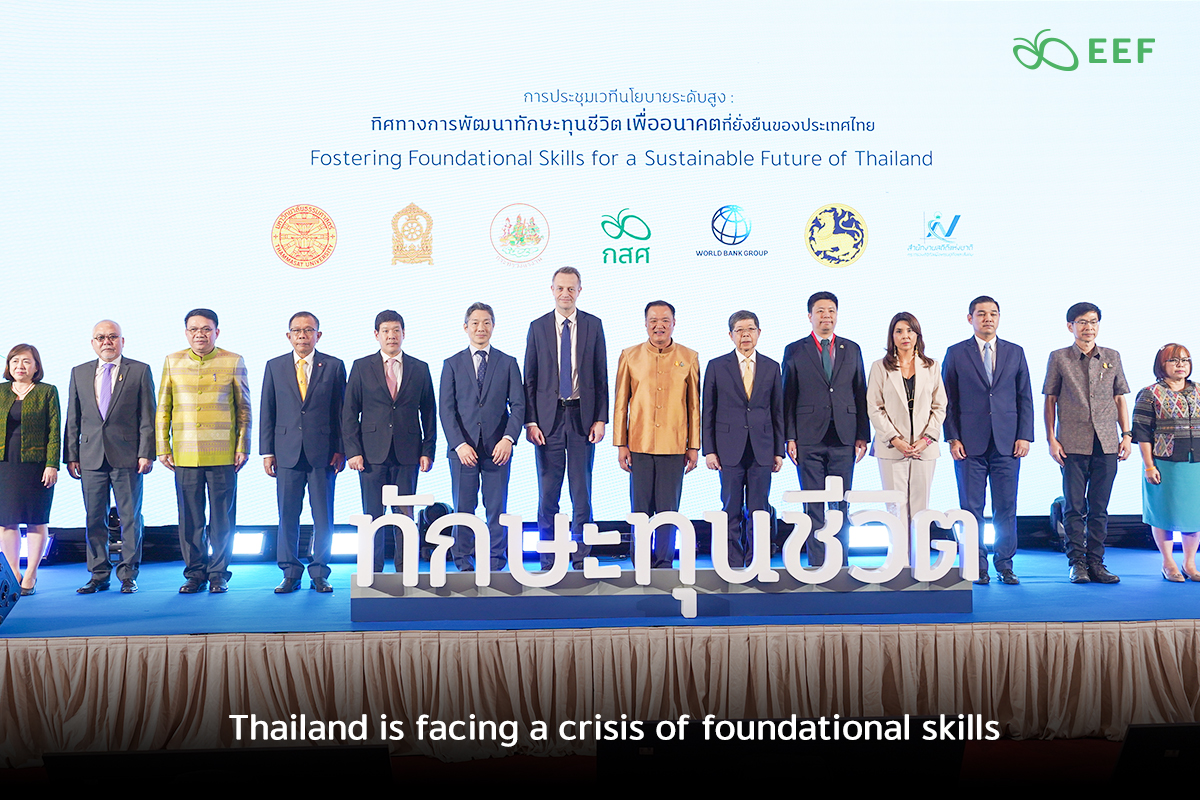
The World Bank and the Equitable Education Fund (EEF) Thailand uncovered that three-quarters of Thai people can barely read and solve problems using digital devices. The economic costs of the skills crisis can be as high as 3.3 trillion Thai Baht or 20% of GDP in 2022, higher than the government budget of 3.1 trillion Thai Baht in the same year. Thailand needs to accelerate investments in foundational skills to push the country out of the middle-income trap.
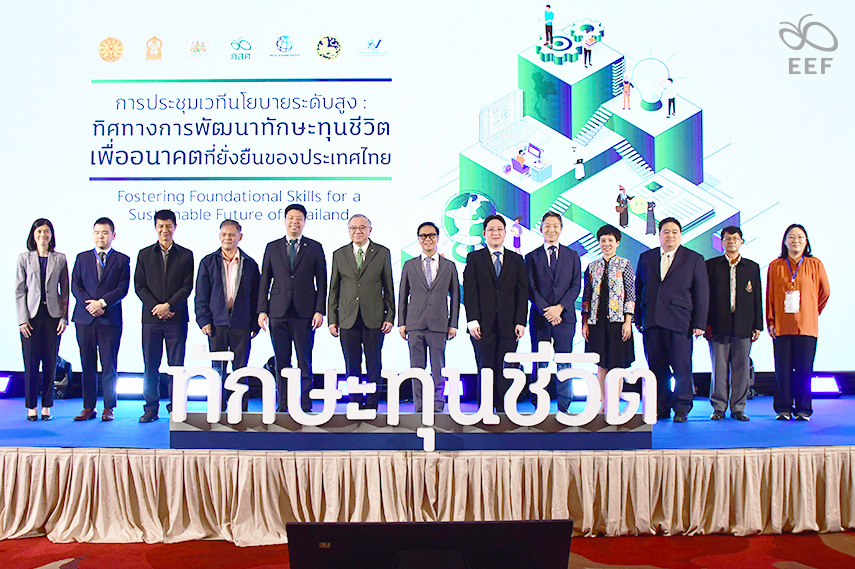
On Wednesday, February 21, 2024, at the Centara Hotel, a High-Level Policy Forum titled “Fostering Foundational Skills for a Sustainable Future of Thailand” was organized by the Equitable Education Fund (Thailand) and the World Bank. Mr. Anutin Charnvirakul, Deputy Prime Minister and Minister of Interior, gave the keynote speech at the opening ceremony.
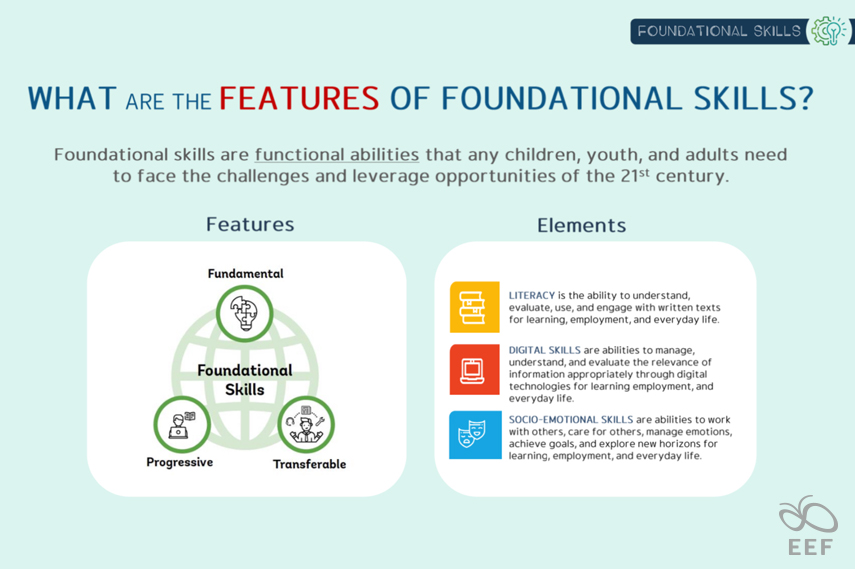
The EEF and the World Bank have released the results of a research project to survey the skills and readiness of the working-age population, known as the Adult Skills Assessment in Thailand (ASAT), which measures literacy, digital, and socioemotional skills of youth and adults aged 15-64 years. The study covers six regions: Bangkok, Central Region, Northern Region, Northeast Region, Southern Region, and the Eastern Economic Corridor: EEC, designed to create indicators representative at the national and regional levels.
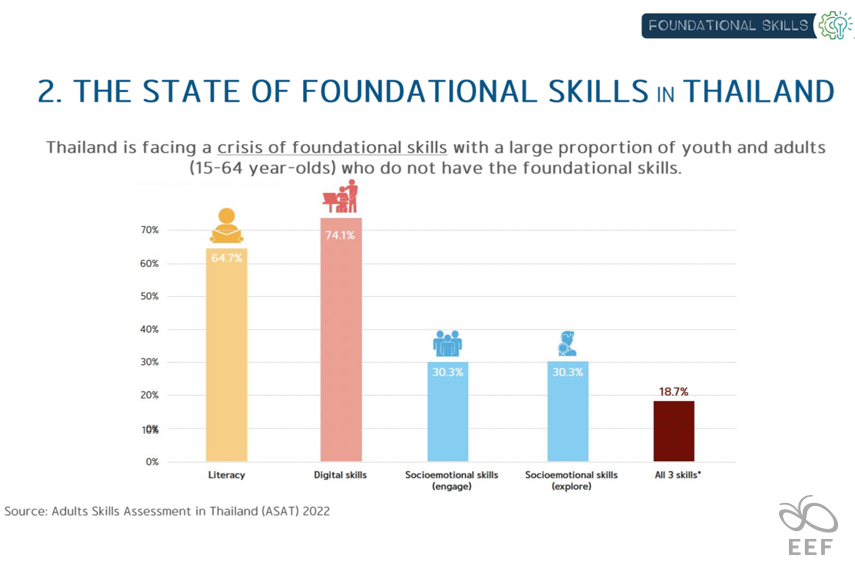
Mr. Koji Miyamoto, Senior Economist at the World Bank, presented the research findings stating that Thailand is facing a foundational skills crisis. There is a large proportion of youth and adults who lack the ability to read basic texts, solve simple problems, or show tendencies to engage with others and explore new horizons.
Almost two-thirds or 64.7 percent of the youth and adult population in Thailand are below the threshold level of literacy skills, meaning they are unable to read and understand short passages to solve simple problems, such as following a medicine label. Meanwhile, three-quarters, or 74.1 percent of youth and adults have poor digital skills, meaning they have difficulty using pointing devices and keyboards on portable computers, and cannot perform simple tasks such as finding the correct price of an item on an online sales website. Moreover, 30.3 percent of youth and adults indicate low levels of socioemotional skills, meaning they show limited tendencies to take social initiatives as well as lack curiosity and imagination, which are characteristics that would lead to success in work. These socioemotional skills are also known to help individuals navigate the uncertainties, risks, and shocks of everyday life, including the latest outbreak of COVID-19 and natural disasters that Thailand often experiences.
Research also found that nearly one-fifth or 18.7 percent of the youth and adult population in Thailand lack life skills in all three areas. This issue poses significant challenges as Thailand strives to become a high-income country, reduce inequality, and improve societal well-being.
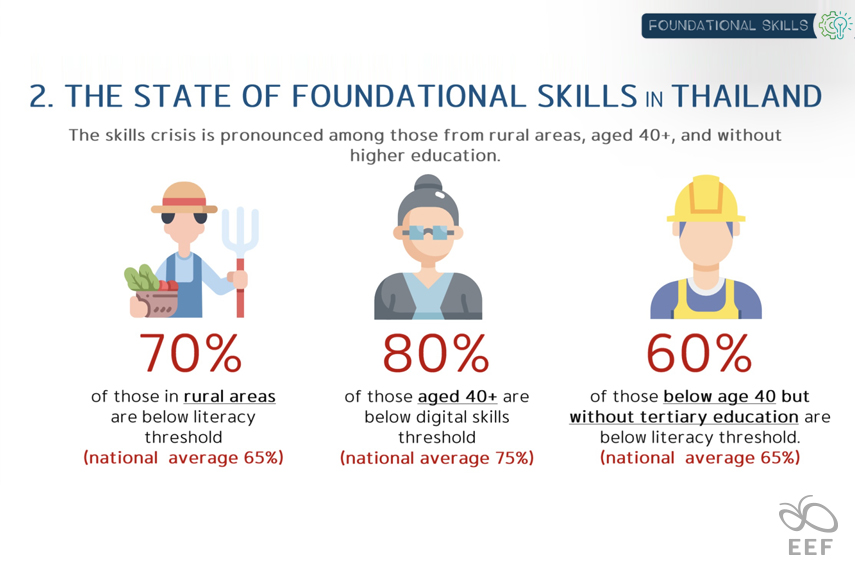
Additionally, it was found that 70 percent of people living in rural areas were underperformers in literacy (compared to the national average of 65 percent). In comparison, 80 percent of people aged 40 and over were underperformers of digital skills (compared to the national average of 75 percent). The skills crisis was also evident even among younger adults with lower levels of education. Sixty percent of people under 40 years of age and with less than tertiary education were underperformers of literacy compared to the national average of 65 percent. Eighty-nine percent of those in the northern region showed below-average literacy levels (national average of 65 percent), while 84 percent showed below-average levels of digital skills (national average of 75 percent).
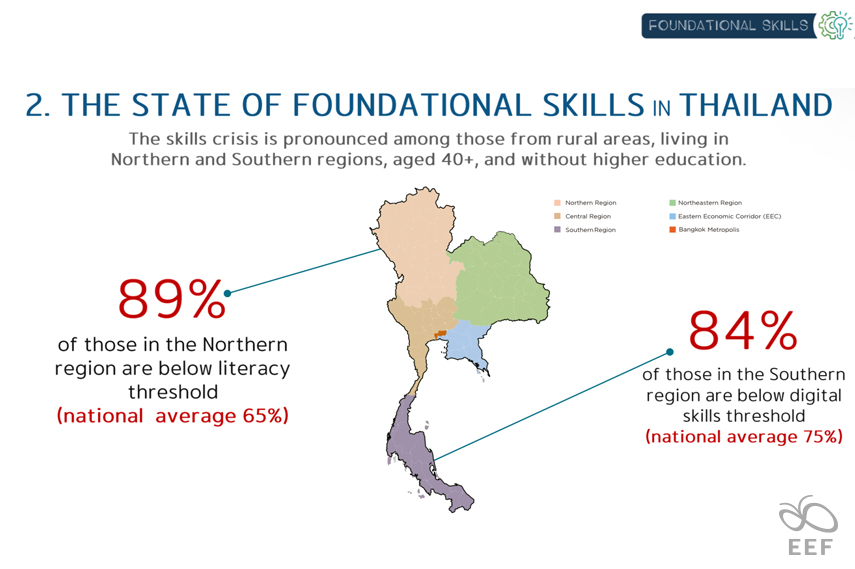
“The skills crisis can have very large implications for the individuals and the society. For instance, the gap in monthly labor income between those with below-threshold and above-threshold skills is estimated at 6,300 Thai Baht or 190 US dollars per month. Having a large proportion of youth and adults who are under-skilled can imply huge economic costs, amounting to 3.3 trillion baht or 20.1 percent of the Gross Domestic Product (GDP) in 2022. This value is higher than the government budget for the year 2022 (3.1 trillion Thai Baht).”
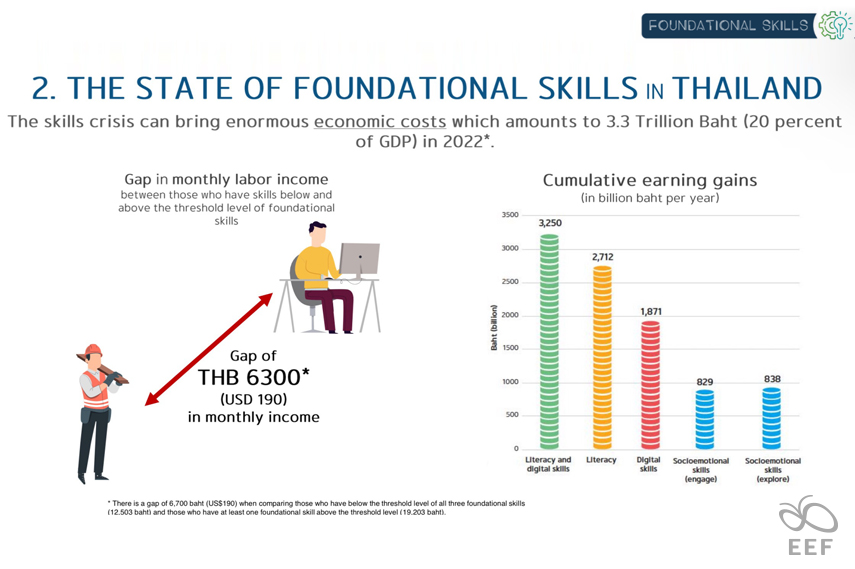
Foundational skills are the kind of abilities that any children, youth, and adults need to overcome challenges and leverage opportunities in the 21st century.
Mr. Anutin Charnvirakul, Deputy Prime Minister and Minister of Interior, said, “The government is committed to developing a strategic approach through this project, which marks the first time that skills measurement data has been used. This will help the government and related sectors identify critical skill gaps and deficiencies necessary to achieve life goals in the 21st century.”
“Findings and policy proposals from this research will help Thailand develop a roadmap for human capital development at all ages, creating the highest results in human development and helping the private sector, both domestically and internationally, have confidence in investing for the future, thus lifting Thailand’s economy. I reiterate that the government is committed and prioritizes human capital development to raise Thailand’s level to that of a high-income country, ensuring people have a good quality of life.”
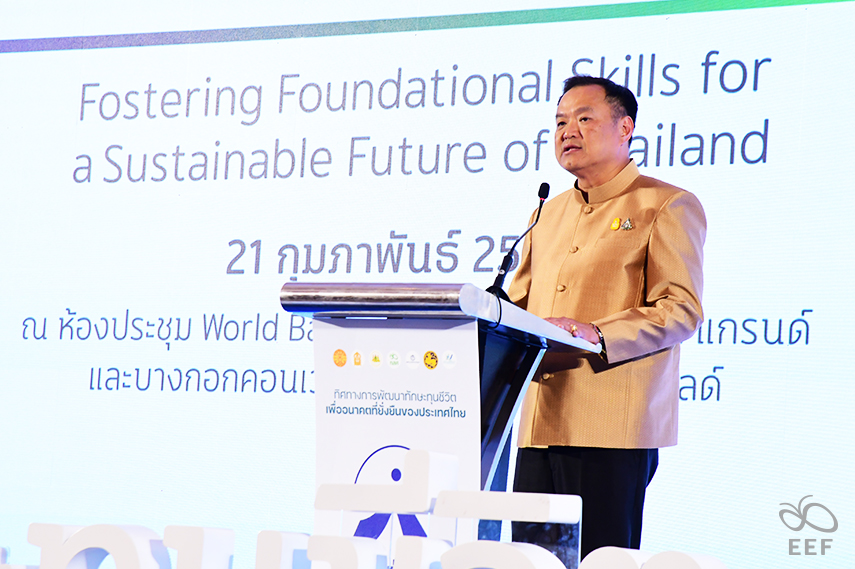
The Deputy Prime Minister stated that Thailand has reached a turning point that requires cooperation from all sectors to create a strong, flexible, and sustainable education and training ecosystem. These efforts align with the government’s vision of a “Social Contract Towards a Learning Society,” aiming to give youth and all Thai people the opportunity to study, regardless of their circumstances, recognizing that a “learning society” is a crucial foundation for economic and social progress.
Dr. Prasarn Trairatvorakul, Chairman of the Equitable Education Fund, highlighted that Thailand has been ranked as a middle-income country since 1976 or 46 years ago, but remains stuck in the “middle-income trap,” requiring approximately a 40% increase in per capita income to succeed in becoming a high-income country. Under collaboration with the World Bank, a research project to survey the Adult Skills Assessment in Thailand (ASAT) aims to use data to inform national policies, enabling Thailand to step out of the middle-income trap within the next few years.
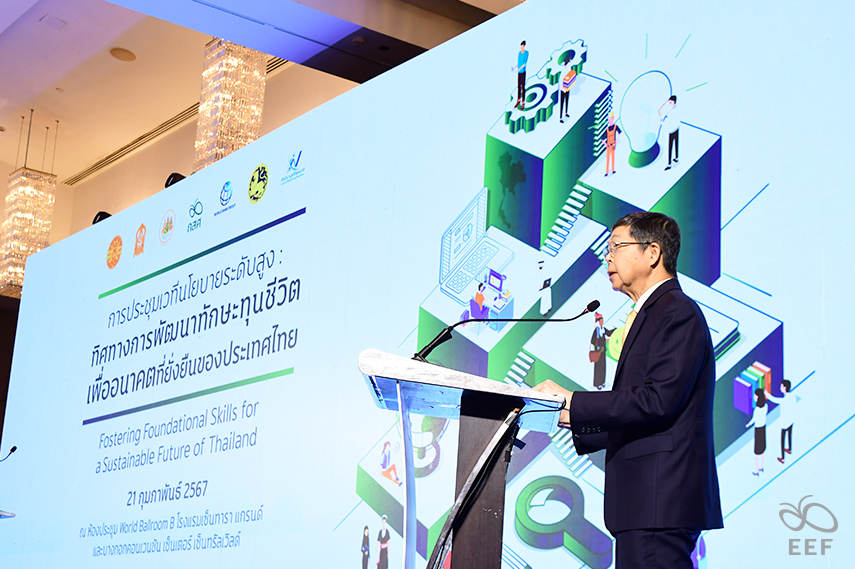
Dr. Prasarn pointed out that from the findings in the EEF research, there are policy proposals to the government in 3 areas:
1. Accelerating investment to strengthen foundational skills in all 3 areas by improving the quality of existing learning at every level of education and training to develop the working-age population in an equitable manner, especially the vulnerable population groups. The availability of foundational skills among the working-age population of Thailand will be an important indicator of Thailand’s economic development in the 21st century.
2. Creating a learning culture for all sectors in Thai society to work together to support the development of foundational skills of every child, youth, and working-age population, resulting in an ecosystem that supports sustainable investments in foundational skills.
3. Investing in human capital, such as foundational skills, and investment in other related measures can be considered a solution to the problem of intergenerational poverty, helping to take Thailand out of the middle-income trap with the highest economic and social value desired. Leadership from the government in promoting all departments and sectors to join together to take advantage of this research into practice for all Thai people.
Source:
High-level Policy Forum: Fostering Foundational Skills for a Sustainable Future of Thailand: https://fb.watch/qDAsL3v6BI/
Fostering Foundation Skills in Thailand Report: https://en.eef.or.th/wp-content/uploads/2024/01/ASAT-E-Book-EN.pdf

